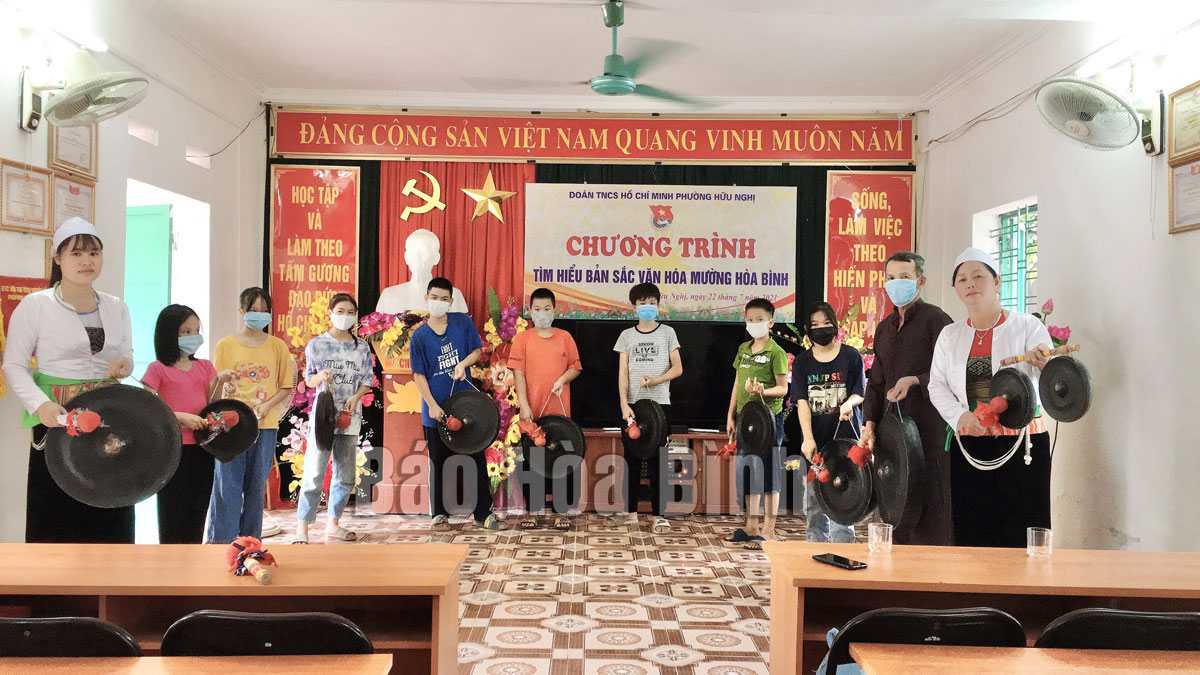
(HBO) – Although Huu Nghi ward is located in bustling Hoa Binh city, it still preserves the traditional culture of the Muong ethnic group.

Through various activities, the elderly have kept the traditions alive, while nurturing the love for indigenous cultural values among young generations.
Huu Nghi ward is the first locality in Hoa Binh city to establish a club of traditional culture and arts, which is operating effectively. With the aim of preserving the traditional culture, the Ho Chi Minh Communist Youth Union in Huu Nghi ward set up the club of folk culture and arts, bringing together 30 members aged from 15 to 35 years.
Nguyen Van Hung, deputy secretary of the local youth union, said the club was officially formed on August 20, 2020, with the first class on the Muong language taught by eminent artist Bui Huy Vong.
Although the COVID-19 pandemic has forced the class to suspend, the club has strived to teach the Muong language to its members and local children. "At first, many club members could not play gongs, speak the Muong language and sing Muong songs. However, most of them now can perform basic gong techniques and folk songs,” said Bui Thi Khanh Hoa, a club member.
"We usually participate in exchanges with units from other localities like Hoa Binh commune and Thinh Lang ward, as well as contests organised by the city,” Hoa added. "Last year, the club won the second prize of a communication contest.”
The youth union has regarded educating and teaching traditional culture to youths as an important task, and plans to maintain the operation of the club in the time ahead, expanding the membership to children and teenagers in the locality.
It has also diversified teaching methods such as making video clips and utilising social networks in this regard, helping to promote the traditional culture among young generations as well as increase their love for the homeland./.
Phong Phu commune, Tan Lac district of Hoa Binh province, is widely regarded as the cultural heartland of the Muong ethnic group. Among its many traditional communities, Luy Ai hamlet (formerly Ai hamlet) stands out as a rare location where the customs and way of life of the Muong Bi people remain largely intact.
The Truong Kha temple festival, a distinctive cultural event held every three years in Vu Ban township, Lac Son district, returned recently with vibrant rituals and folk traditions of the Muong people. Located next to the Buoi River in the Muong Trao fields, the Truong Kha Temple is dedicated to the three Kun Dol deities, revered for teaching farming techniques, irrigation, weaving, and protecting the harvest.
The demand for spaces serving community activities of residents in various areas across Hoa Binh city has been satisfied as local cultural houses now feature modern, spacious facilities thanks to the effective implementation of Resolution No. 49/NQ-HDND issued on December 28, 2021 by the city People's Council, which approved the plan for reorganising, converting, and allocating land for the construction, repair, and expansion of cultural houses in Hoa Binh’s villages and residential areas until 2025.
At the end of May, the Hoa Binh Provincial Ethnic Arts Troupe organized a series of performances for residents in Region 2 and Region 3 communes across the province. Bringing art to ethnic communities in remote, isolated, and especially disadvantaged areas has become a meaningful activity. These are not merely artistic performances but also journeys to disseminate cultural values, enrich spiritual life, and contribute to preserving the cultural identity of ethnic minorities.



